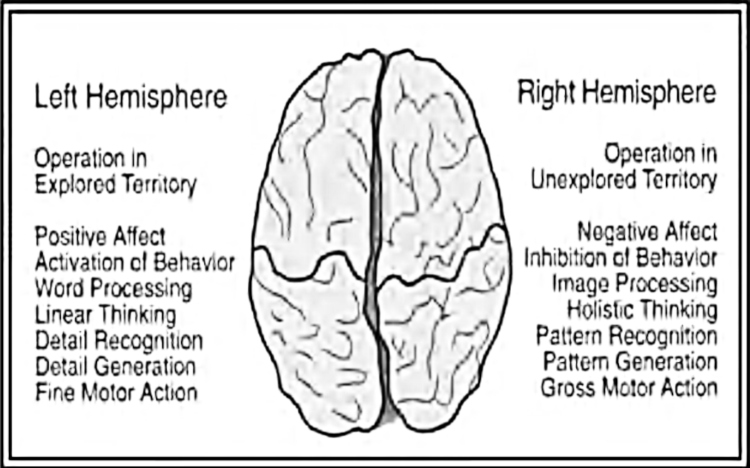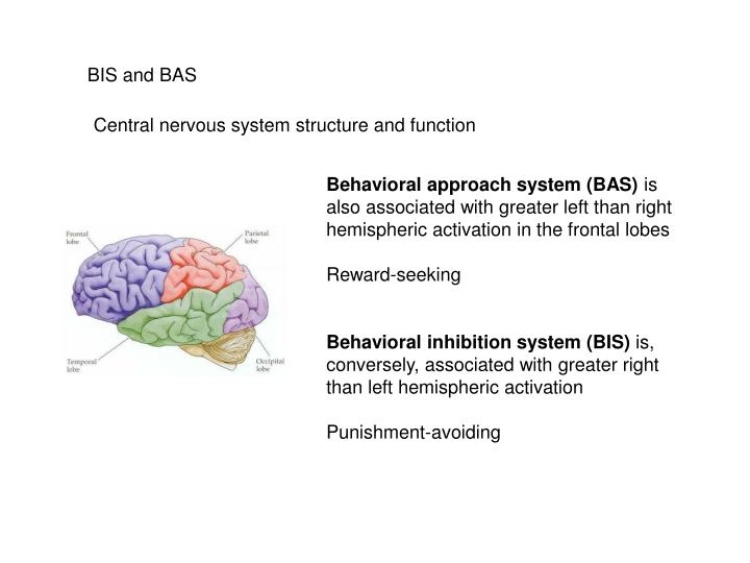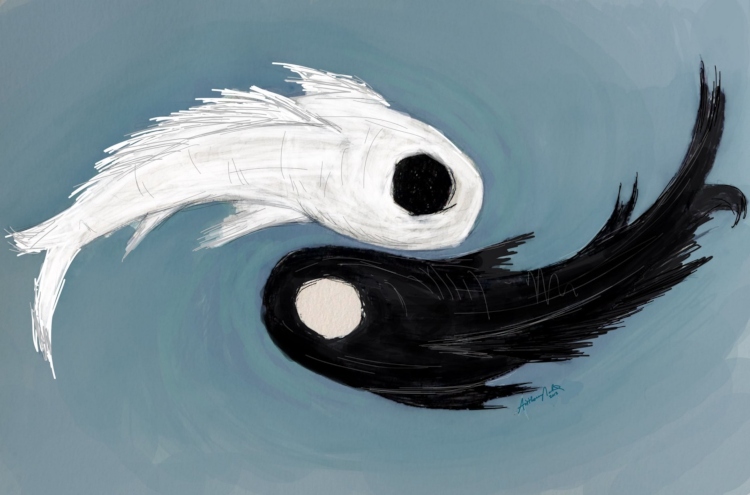Hey Google: What Does Left Brain Dominant Mean?
[perfectpullquote align=”full” bordertop=”false” cite=”” link=”” color=”#1AC4A8″ class=”” size=””]Hey Google: “What does left brain dominant mean?”[/perfectpullquote]
Your brain is split into two hemispheres, simply designated ‘left’ and ‘right’. Both hemispheres have distinct but equally important functions. To understand the role each hemisphere plays, we first need to understand how our brain works.
A World of Value
There are two ways in which one can view the world. The first is familiar due to the advent of rationalist thought. This is the scientific perspective; the world of things. Our universe is comprised of objects with objective, factual descriptions.
For example, a kitchen chair can be correctly perceived as a wooden carving. However, this is not how you perceive a chair in real-time. When you see a chair, you see something to sit on. It is a tool. If you see a chair blocking your way to the door, it’s an obstacle.
Furthermore, what is a chair? Is a tree stump a chair? Is the bottom step a chair? Is your bed a chair? They share no obvious objective quality. Yet, when you need to sit down, they all become chairs. This is because you don’t naturally categorise things by their objective qualities.
Consequently, things categorised according to their objective qualities form the ‘proper set’, as described by the psycholinguist Roger Brown, while our natural categories are called, just that, ‘natural categories‘.
This is the second way in which we can view the world, and it constitutes our natural perception. You have a goal, you wish to achieve that goal, therefore things manifest themselves to you as either a tool towards that goal, or an obstacle before that goal.

This is in line with David Hume’s ‘Naturalistic Fallacy’; ‘you cannot derive an ought from an is’. Essentially, you cannot tell how to act in the presence of an object simply by knowing its objective qualities, and you must know how to act to move forward in life.
This is the world of value; the world as a place for action, and this is how you perceive the world. In this world, there are three constituent elements; ‘Unexplored Territory’ or the Unknown, ‘Explored Territory’, or the Known, and the mediatory, exploratory process, or individual consciousness.
The Right Brain
Considering our conceptualisation of the world as a place of value, let’s consider these implications on brain functionality.
Right brain activity is associated with negative emotion and the Behavioural Inhibition System (BIS). The BIS is concerned with danger. It employs two tactics to tackle this encounter; approach or avoidance. It makes us intensely vigilant and attentive in the face of potentially threatening situations.
A threatening situation is when your plans are disrupted by an obstacle. The very fact of the obstacle’s existence proves that your current knowledge is insufficient. You are no longer where you thought you were. Think of this as entering Unexplored Territory, or Chaos.
This is when the right hemisphere kicks into gear. It specialises in the stoppage of ongoing behaviour. As this inevitably results in the disruption of goal achievement, negative emotion is produced, awakening the BIS.

Consequently, those high in the Big Five personality trait Neuroticism, one’s sensitivity to anxiety and depression, have more brain cells dedicated to their right brain and reduced thickness in its cortical areas.
The right hemisphere is specialised for image processing and holistic thinking. When in Unexplored Territory, the obstacle needs to be processed quickly. Furthermore, it needs to be considered in its entirety, hence holistic thinking.
Its other specialities include pattern recognition, pattern generation and gross motor action. This is perfect for navigating Unexplored Territory. It allows you to quickly conjure representations of the obstacle and summon solutions to the problems it presents.
The right brain is essential in the first stage of exploratory behaviour. It hastens your forward movement for fear of falling. It rapidly examines the novel situation and conjures provisional solutions in order to transform the unknown to the known.
In essence, the right brain is not concerned with the descriptive, sensory qualities of an object. It just wants to know how to act in its presence; how to modify behaviour so that it can let go of the proverbial wheel.
The Left Brain
The existence of Unexplored Territory necessitates its polarity; Explored Territory, or Order. This can be thought of as the known, or order. When you are in Explored Territory, you are moving forward towards your goal.
Consequently, things on the path have been rendered known. At best, things have become useful tools, at worst, they are irrelevant. Therefore, we stop engaging in avoidance tactics and begin the process of exploratory approach. This is when the left brain enters the stage.
The left brain is, in part, governed by the BIS’ opposing twin, the Behavioural Approach System (BAS). The BAS is tightly linked with positive emotion, or trait Extroversion. The BAS is mainly concerned with achieving goals and obtaining rewards.

Goal achievement produces dopamine, a neurotransmitter that produces positive emotion. For further context, cocaine produces dopamine. Those high in trait Extroversion are geared towards approach behaviour, which is why proposals have been made to rename the trait ‘Positive Emotion’.
[perfectpullquote align=”full” bordertop=”false” cite=”” link=”” color=”#1AC4A8″ class=”” size=””]Suggested Reading: Practical Psychology | Loneliness is Genetic and Beatable[/perfectpullquote]
Differences in left and right brain functionality are also evident on a structural level. Extroverts have more brain cells dedicated to their left hemisphere, in addition to a reduced cortical thickness of the right hemisphere.
When in Explored Territory, the left brain rules. Think of it like this: when you are in a situation where you know what you are doing, and know what needs to be done, you engage in practised behaviours, knowing that these behaviours will probably produce positive results.
When a thing has been comprehensively explored, it either produces something satisfying, something promising, or it becomes irrelevant. This lack of threat or punishment allows the left brain to engage in more deliberate and thoughtful behaviour.
The left hemisphere specialises in linguistic processing and communication. The written and spoken word can be thought of as creative tools. They allow us to examine the unknown and transform it into the known. Furthermore, with language we can gift others with our knowledge and update their perceptions.

Other specialities include linear thinking and comprehending wholes in terms of their constituent elements. When working towards our goals, these abilities allow us to think through problems logically and break down things into their smaller parts.
Its final speciality is fine motor skill. This is required for the detailed analysis and manipulation of objects, which results in the creation of tools that enable us to achieve our goals with more ease.
A Dominant Left Brain?
Having a dominant left brain is most likely a good thing. It indicates that you are in Explored Territory, that you know what you’re doing. You’re most likely enjoying positive emotion and engaged in activities you find enjoyable. Perhaps you’re extroverted with a wide social circle.
However, there is value in the right brain. When you solely inhabit Explored Territory for too long, things become boring. There is no novelty, nothing to explore. Ancient myths have recognised this problem and formulated a functional solution.
Taoism posits that the Way, the optimal path forward, is predicated on the Yin and Yang. These can be thought of as Unexplored Territory and Explored Territory respectively. To follow the Way, you must find balance between the two.

If you spend too much time in the Unknown, you’ll be crippled by fear and anxiety. If you spend too much time in the Known, you’ll become stultified and bored. The trick is to stand with one foot in each.
This balances both brains, not allowing either to become dominant. That is the Way forward.
